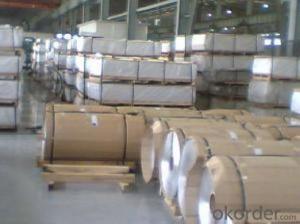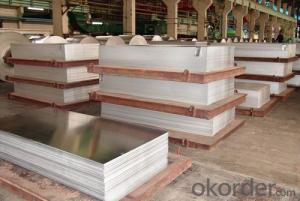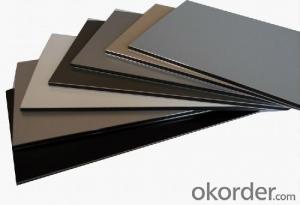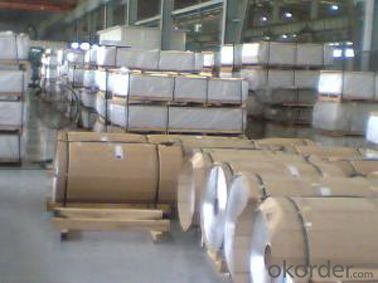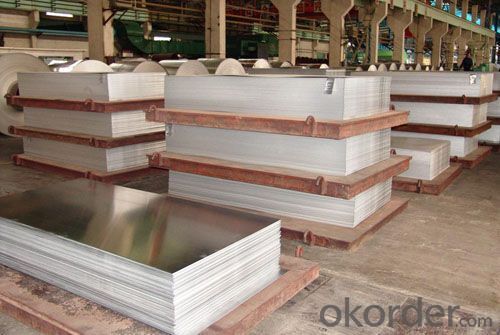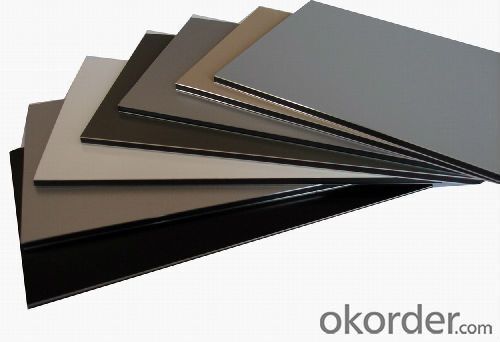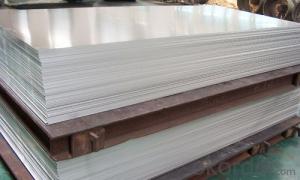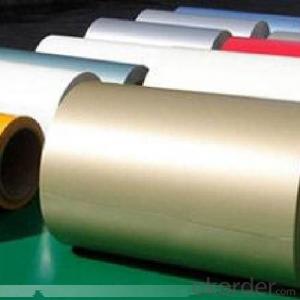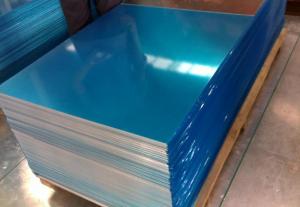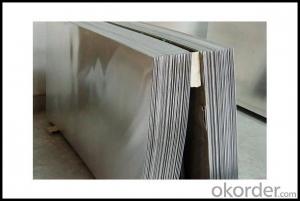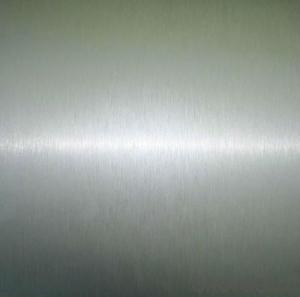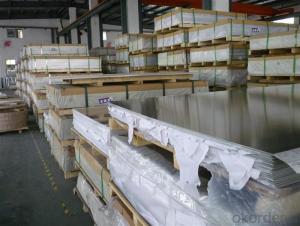PVC Laminated Thin Aluminum Sheets from China
- Loading Port:
- Shanghai
- Payment Terms:
- TT OR LC
- Min Order Qty:
- 5 m.t.
- Supply Capability:
- 9000 m.t./month
OKorder Service Pledge
OKorder Financial Service
You Might Also Like
Specification
Product Description
Aluminum Main Product Series:
1 Series: 1050 1060 1070 1100 1200 1235 etc.
2 Series: 2024 2030 etc.
3 Series: 3003 3005 3104 3105 etc.
5 Series: 5005 5052 5056 5083 5086 5154 5182 5754 etc.
6 Series: 6061 6063 etc.
7 Series: 7075 etc.
8 Series: 8006 8011 8079 etc.
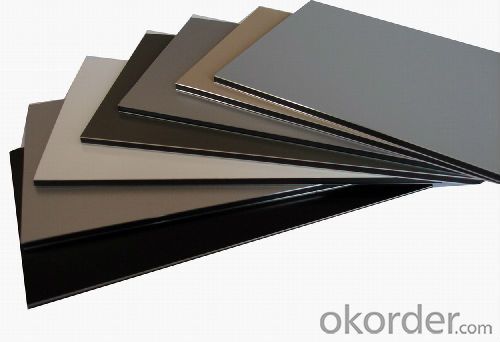
Specifications:
Material | 1, 2, 3, 5, 6, 7, 8 Series |
Temper | O, F, H14, H34, H32, H112, T4, T6 |
Surface treatment | Mill Finish, Anodized, Electroplates, Powder Coated, Polished finish |
Color | Plain, Silver, Black, Red, Blue, or as required |
Length | 1000mm~6000mm, or as required |
Shape | Plain, bossed, or as per the drawings and samples |
Fabrication | Cutting, drilling, punching, bending, etc |
Tolerances | As per your requirements |
Package | inner plastic paper interleaving each piece profile, outer fixed by plywood; or customized. |
Payment terms | T/T or L/C at sight |
Price terms | FOB; CIF |
Delivery time | 15~20 days after order confirmation |
Certification | ISO 9001:2008; SGS |
Capacity | 5000 tons per month |
MOQ | 1 Metric ton |
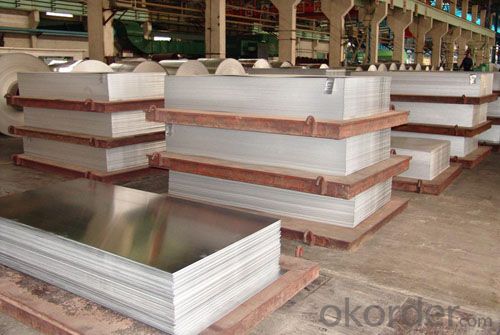
Applications:
1. Lighting.
2. solar reflector plate
3. architectural appearance
4. interior decoration: ceiling, furniture, cabinets and so on.
5. elevator
6. plate, nameplate, bags
7. automotive interior and exterior decoration
8. interior decoration: such as photo frame
9. household appliances, refrigerator, microwave oven, audio equipment, etc.
10. aerospace and military aspects, such as satellite.
11. machinery parts processing, mold manufacturing.
12. chemical/insulation pipeline coating.
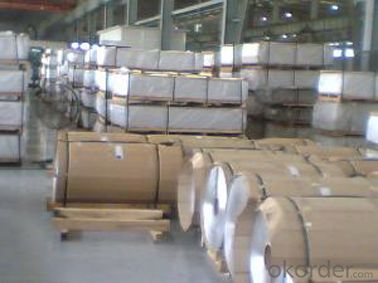
- Q: Are aluminum sheets resistant to rust?
- Yes, aluminum sheets are highly resistant to rust due to their natural oxide coating that forms a protective barrier against corrosion.
- Q: Are the aluminum sheets suitable for manufacturing traffic signs?
- Indeed, traffic signs can be manufactured with aluminum sheets. The durability, lightweight nature, and resistance to corrosion that aluminum offers make it a favored option for traffic signs. These attributes enable the signs to endure diverse weather conditions and guarantee a prolonged lifespan. Furthermore, aluminum sheets lend themselves easily to being shaped into various sizes and designs, thus facilitating the creation of personalized traffic signs. All in all, opting for aluminum sheets in the production of traffic signs is a dependable and effective decision.
- Q: Are aluminum sheets resistant to saltwater corrosion?
- Yes, aluminum sheets are highly resistant to saltwater corrosion.
- Q: Are 101 aluminum sheets suitable for chemical transfer piping?
- Chemical transfer piping cannot rely on 101 aluminum sheets as they are unsuitable. The reactivity and corrosion propensity of aluminum make it generally unfit for handling specific chemicals. Industries like aerospace or construction prefer aluminum due to its lightweight nature and excellent thermal conductivity. However, for chemical transfer piping, it is wiser to opt for materials that possess corrosion resistance and can endure the specific chemicals being transported. Stainless steel, PVC, or high-density polyethylene (HDPE) are recommended alternatives.
- Q: What are the different methods for joining aluminum sheets?
- There are several methods for joining aluminum sheets, including welding, riveting, adhesive bonding, and mechanical fastening. Welding involves melting and fusing the aluminum sheets together using heat, while riveting involves using metal fasteners to hold the sheets together. Adhesive bonding uses specialized adhesives to create a strong bond between the sheets, and mechanical fastening involves using screws, bolts, or other mechanical devices to secure the sheets together.
- Q: The difference between aluminum plate and aluminum plate
- Aluminum plate is a large piece, the regular width is 90 to 130 centimeters. The aluminum plate is cut aluminum plate, usually according to requirements made several centimeters wide.
- Q: An aluminum clock pendulum having a period of 1.00 s keeps perfect time at 20 degrees celcius. (A) When placed in a room at a temperature of -5.0 Celcius, will it gain or lose time? (B)How much time will it gain or lose every hour.
- this concerns change in length of aluminum due to fall in temp T(20 C) = 2pi√(L20/g = 1 sec L20 = g/4pi^2 ----------- (1) T(-5 C) = 2pi√(L5/g L5 = T(5)^2*g /4pi^2 ----------- (2) coefficient of linear expansion of aluminum = alpha alpha = delta L/L* delta T 23*10^-6 = (L5 - L20) /L20*(- 5 - 20) (L5 - L20) /L20 = - 25*23*10^-6 L5/L20 = 1 - 25*23*10^-6 = 0.999425 --- (3) L5 decrease in length T(5) will reduce (2) / (1) L5/L20 = [T(5)^2*g /4pi^2] * [4pi^2/g] = 0.999425 [T(5)^2] = 0.999425 T(5) = 0.9997 sec this is period when in (-5 C) room a) pendulum gains time in cold room word gains is used because it takes less in 1 oscillation. b) it gains time = 1 - 0.9997 = 0.0003 sec in 1 sec gain in every hour = 0.0003*3600 = 1.08 sec
- Q: Can aluminum sheets be anodized with custom colors?
- Yes, aluminum sheets can be anodized with custom colors. Anodizing is an electrochemical process that creates a protective oxide layer on the surface of aluminum, and during this process, dyes can be applied to achieve a wide range of custom colors.
- Q: Can the aluminum sheets be used for manufacturing heat exchanger fins?
- Yes, aluminum sheets can be used for manufacturing heat exchanger fins. Aluminum is a commonly used material for heat exchangers due to its excellent thermal conductivity and corrosion resistance. The lightweight and malleable nature of aluminum sheets make them ideal for forming fins with high surface area to enhance heat transfer. Additionally, aluminum is readily available and cost-effective, making it a popular choice in heat exchanger manufacturing.
- Q: Are aluminum sheets prone to warping?
- Yes, aluminum sheets are prone to warping, especially when exposed to high temperatures or subjected to excessive pressure. However, the extent of warping depends on various factors such as the thickness of the sheet, the specific alloy used, and the conditions it is exposed to.
Send your message to us
PVC Laminated Thin Aluminum Sheets from China
- Loading Port:
- Shanghai
- Payment Terms:
- TT OR LC
- Min Order Qty:
- 5 m.t.
- Supply Capability:
- 9000 m.t./month
OKorder Service Pledge
OKorder Financial Service
Similar products
Hot products
Hot Searches
Related keywords
